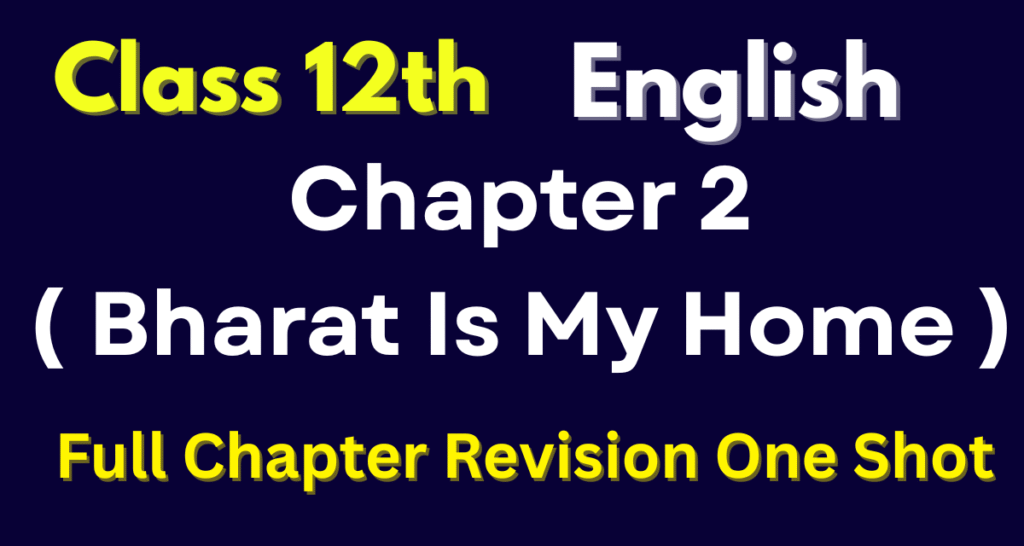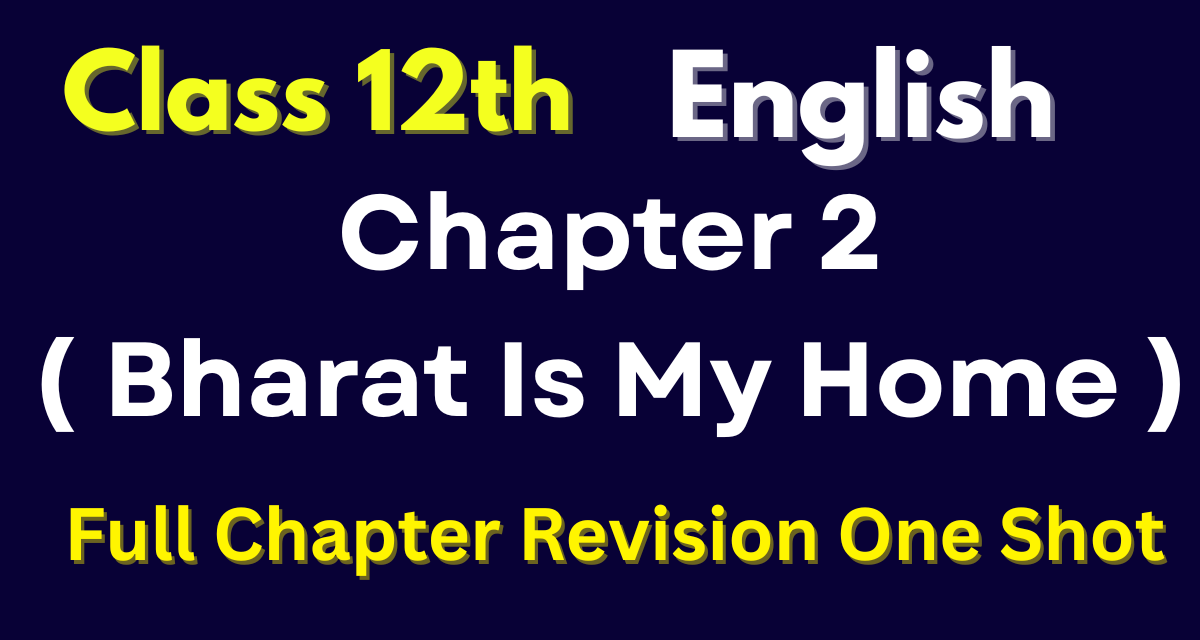First Phase : 50 Objectives With Answer
- Who is the author of “Bharat is My Home”?
Answer: Dr. Zakir Husain - Dr. Zakir hussain delivered the speech on :
Answer: taking oath as President of India - Dr. Zakir Husain became the President of India in?
Answer: 1967 - Dr. Zakir Husain was born in?
Answer: 1897 - How long did Dr. Zakir Husain live?
Answer: 72 years - “Bharat is My Home” is an extract from?
Answer: A speech - The overall theme of the speech is?
Answer: Patriotism and unity - The world erudition stamds or?
Answer: great knowledge - Power should be use for only?
Answer: moral purpose - What is the business of education as per Dr. Zakir Husain?
Answer: Growth of national culture and character - Dr. Zakir Husain served as Governor of?
Answer: Bihar - Who said, “The whole of Bharat is my home and its people are my family”?
Answer: Dr. Zakir Husain - Dr. Radhakrishna explained exceptionally
Answer: Indian philosophy - What should power be used for, according to Mahatma Gandhi mentioned in the speech?
Answer: Moral purposes - Dr. Zakir hussain took the oath of loyalty to the
Answer: Constitution - Dr. Zakir Husain calls India a “young state” because?
Answer: It became a Republic in 1950 - Dr. Zakir hussain was born in which state?
Answer: Hyderabad - Dr. Zakir Husain pledges loyalty irrespective of?
Answer: Religion or language - The Indian culture is the example of?
Answer: unity in diversity - Dr. Radhakrishnan is mentioned as bringing to the Presidency?
Answer: Erudition and moral stature - The speech was delivered in?
Answer: 1967 - Dr. Zakir Husain views the past as?
Answer: Alive and dynamic - Dr. Zakir hussain was associated with
Answer: education - Dr. Zakir hussain delivered this speech on?
Answer: 1966 - Education should foster?
Answer: National purpose - Dr. Zakir Husain died in?
Answer: 1969 - The oath taken by Dr. Zakir Husain was as?
Answer: President of India - ……… Was the role model of Dr. Zakir hussain?
Answer: Dr. Radhakrishnan - What is the role of the President in the speech?
Answer: Head of the family (nation) - Dr. Zakir Husain’s speech is about?
Answer: Pledge to India’s culture and welfare - India became a Republic on?
Answer: 26th January 1950 - Dr. Radhakrishnan never lost is faith in the___?
Answer: essential humanity of man - Dr. Zakir Husain was a great?
Answer: Nationalist - What does “work in and through society” mean?
Answer: Social development - Dr. Zakir hussain was died on
Answer: 1969 - Dr. Zakir Husain entered the President’s office with?
Answer: Humility - The ancient culture of India is described as?
Answer: Totality of contributions from all groups - What is the fascinating task mentioned?
Answer: Building a just and prosperous life - Dr. Zakir hussain entered the office with?
Answer: total dedication - The speech was after oath on?
Answer: 13th May 1967 - India gained freedom in?
Answer: August 1947 - Dr. Zakir hussain was an emminent___?
Answer: educationist - The “home” in the speech refers to?
Answer: Entire Bharat - What is the prime instrument of national purpose?
Answer: Education - Dr. Zakir Husain’s endeavour is to make home?
Answer: Worthy for a great people - The speech mentions Mahatma Gandhi’s idea on?
Answer: Power for moral purposes - Dr. Zakir Husain was appointed to lead for?
Answer: Some time (as President) - The culture of India is?
Answer: Ancient and evolving - What does the speech dedicate to?
Answer: Strength and progress of India - Dr. Zakir Husain calls people to?
Answer: Work hard for development

Second Phase : 15 Short Type Questions Answers
- On what occasion did Dr. Zakir Husain deliver the speech “Bharat is My Home”?
Answer: Dr. Zakir Husain was delivered the speech on 13th May 1967, immediately after taking the oath as the third President of India, expressing his deep our commitment to the whole nation. - What does Dr. Zakir Husain mean by “young state of an ancient people”?
Answer: He refers to India’s ancient civilization spanning 1000s of years, but as a modern Republic formed in 1950 after independence in 1947, making it a young political entity of our nation. - What pledge does Dr. Zakir Husain take regarding India’s culture?
Answer: He pledges loyalty to India’s past culture and service to its totality, committing to preserve and develop it without bias towards any caste, religion or language. - Why does Dr. Zakir Husain call the whole of Bharat his home?
Answer: He views the entire nation as his home and its diverse people as his family, emphasizing unity beyond caste, creed, colour or region for collective progress. - What is the business of education according to the speech?
Answer: Education’s primary role is to foster national culture, character, and purpose, helping individuals grow morally while contributing to societal harmony and development. - How does Dr. Zakir Husain describe “work on one’s self”?
Answer: It means pursuing moral growth through self-discipline as a free individual, leading to the development of a free moral personality essential for personal fulfillment. - What does “work in and through society” imply in the speech?
Answer: It refers to social efforts for national strength, where individual actions align with collective goals, ensuring prosperity and justice for all citizens. - How does the speech reference Mahatma Gandhi’s views on power?
Answer: It echoes Gandhi’s belief that power must be used only for moral purposes, dedicating national strength to peace and ethical progress rather than aggression. - What role does Dr. Zakir Husain see for himself as President?
Answer: He sees himself as the temporary head of the national family, striving to make Bharat strong, beautiful, and worthy of its great people. - Why does Dr. Zakir Husain emphasize the past being “alive and dynamic”?
Answer: He believes India’s ancient heritage is not static but evolving, guiding the present to build a just, prosperous, and graceful future. - What distinctions does the speech reject in national welfare?
Answer: It rejects distinctions of caste, colour, creed, religion, or language, promoting equal welfare and unity for all Indians. - How long did Dr. Zakir Husain serve before becoming President?
Answer: He served as Governor of Bihar from 1957 to 1962 and Vice-Chancellor of Aligarh Muslim University, bringing vast experience to the presidency. - What is the “fascinating task” mentioned in the speech?
Answer: The task of building a just, prosperous, and graceful life for all, engaging the nation in constructive development and moral elevation. - How does the speech link individual and social work?
Answer: Individual moral growth (work on self) complements social efforts (work through society), together creating a strong, harmonious nation. - What emotion does Dr. Zakir Husain express towards India?
Answer: Profound love and humility, viewing his role as an honor to serve the ancient yet young nation and its diverse family.

Third Phase : 15 Long Type Question Answers
- Summarize Dr. Zakir Husain’s speech “Bharat is My Home” and highlight its main pledges.
Answer: In his 1967 inaugural speech as President, Dr. Zakir Husain expresses profound patriotism, calling India a “young state of an ancient people” with a rich, evolving culture. He pledges loyalty to this heritage, service to its totality, and commitment to national strength and progress without biases of religion, language, caste, or creed. Viewing Bharat as his home and its people as family, he vows to make it strong and beautiful, worthy of a prosperous life. - Explain the significance of the line “The whole of Bharat is my home and its people are my family” in the context of Indian unity.
Answer: This iconic line encapsulates Dr. Zakir Husain’s vision of national unity amid diversity. Delivered post-oath in 1967, it transcends regional, religious, or linguistic divides, portraying India as a singular family home. In a post-independence era facing partition scars and social fractures, it promotes inclusivity, rejecting caste or creed-based distinctions. Husain pledges welfare for all, urging collective effort for strength and prosperity. - Discuss Dr. Zakir Husain’s views on education and its role in nation-building.
Answer: Dr. Husain sees education as the “prime instrument of national purpose,” not mere knowledge but a tool for cultivating national culture and character. It should nurture moral personalities through self-discipline while aligning individuals with social harmony. - How does the speech integrate Gandhi’s philosophy with national dedication?
Answer: Husain invokes Gandhi to stress that national power must serve moral ends, not aggression, dedicating strength to peace. This integrates ahimsa and satyagraha into statecraft, urging ethical governance. In context, post-1962 war India needed moral resilience; Husain’s pledge mirrors Gandhi’s selfless service. For exams, analyze how this fosters “strong yet peaceful” nationhood, relevant for global issues like climate ethics. - Analyze the theme of patriotism in “Bharat is My Home” and its relevance today.
Answer: Patriotism here is humble service, not jingoism—Husain’s humility as President underscores duty to ancient culture and modern republic. Themes include unity in diversity, moral power, and balanced development. Today, amid polarization, it counters divisiveness, promoting constitutional patriotism. - Describe how Dr. Zakir Husain balances individual and social responsibilities.
Answer: Husain views individual work as moral self-improvement for a “free personality,” while social work channels it into national strength. They interlink: self-discipline prevents chaos, societal efforts ensure equity. This holistic approach, rooted in Indian ethos, avoids individualism’s pitfalls. - ” Bharat is my Home” a motivational address for the youth?
Answer: As a call to action, it motivates youth by framing nation-building as a “fascinating task” of justice and grace. Husain’s pledges inspire ethical leadership, urging moral power over might. - Compare Dr. Zakir Husain’s presidential vision with that of Dr. Radhakrishnan mentioned in the speech.
Answer: Both emphasize erudition and moral stature; Radhakrishnan championed dignity and justice, while Husain adds cultural loyalty and family unity. Radhakrishnan’s spiritual values complement Husain’s dynamic heritage preservation. - How does the speech portray India’s cultural evolution?
Answer: India’s culture is a “totality” from diverse groups, alive and dynamic—not static relics but evolving guides for future. Husain pledges its service, blending ancient wisdom with republican youthfulness. This evolution counters cultural stagnation, promoting adaptive unity for global challenges
. - Evaluate the speech’s call for national strength and its implications for 2026.
Answer: Strength means moral, prosperous Bharat—strong against threats yet peaceful. Implications: Youth must prioritize ethics in AI/digital era, ensuring inclusive growth. For exams, link to Viksit Bharat@2047, where Husain’s vision drives sustainable, equitable development. - Explain the emotional appeal in Dr. Zakir Husain’s reference to India as a family.
Answer: By calling people “family,” Husain evokes emotional bonds, dissolving divides for shared welfare. This appeal fosters empathy, crucial post-independence healing. Today, it counters isolationism, inspiring communal harmony in multicultural India. - Discuss the role of the past in shaping the future as per the speech.
Answer: The past is “alive,” providing moral roots for dynamic progress. Husain urges loyalty to it for building graceful lives, balancing tradition-innovation. - How does the speech address power and peace?
Answer: Power, per Gandhi, must be moral for peace—national strength dedicated to justice, not dominance. This pacifist ethos promotes global harmony, urging ethical foreign policy. Exam relevance: Applies to India’s rising role in world affairs. - What lessons on leadership can be drawn from Dr. Zakir Husain’s humility?
Answer: Humility tempers power; as family head, he serves, not rules. Lessons: Ethical decision-making, inclusivity. For youth leaders, it models servant-leadership in democracy. - Why is “Bharat is My Home” relevant for contemporary India?
Answer: Amid diversity challenges, it reinforces unity, moral education, and progress.

